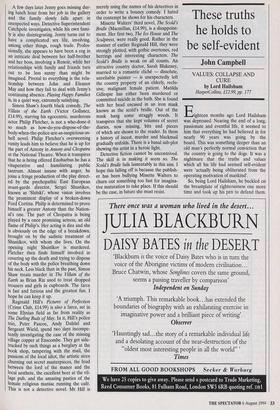These truths he holds to be self-evident
John Campbell
VALUES: COLLAPSE AND CURE by Lord Hailsham HarperCollins, .£12.99, pp. 177 Eighteen months ago Lord Hailsham was depressed. Nearing the end of a long, passionate and eventful life, it seemed to him that everything he had believed in for nearly 90 years was going by the board. This was something deeper than an old man's perfectly normal conviction that the country is going to the dogs. It was a nightmare that the truths and values which all his life had seemed self-evident were 'actually being obliterated from the operating motivation of mankind'.
So, being Lord Hailsham, he buckled on the breastplate of righteousness one more time and took up his pen to defend them. The result is a short, very simple, highly personal affirmation of the elementary principles of ethics, morality and law. To emphasise the book's simplicity and direct- ness — perhaps also to disguise its brevity HarperCollins have taken the eccentric decision to print it in the author's hand- writing.
At first sight this seems no more than an attention-grabbing gimmick. As you begin to read, however, it acquires a certain charm, as though one were reading a long letter from one's grandfather — particular- ly since Hailsham, as always, refers frequently to his own father and grandfa- ther. For a few pages I began to think that it might be the classic distillation of enduring wisdom which the flyleaf promises. Ultimately, though, the text is simply too flimsy to stand up even in this form.
His central quarrel is with Logical Posi- tivism, and specifically A. J. Ayer, whose contention that moral value judgments are meaningless (literally non-sense) he sees as the root of modern nihilism. He refutes it to his own satisfaction in a few pages by demonstrating that
the whole doctrine . . . that metaphysical doctrines and propositions, being incapable of verification, are ipso facto non-sense, is itself a metaphysical proposition intrinsically incapable of verification . . . It fails because it is self-contradictory.
By contrast, his own values have endured for centuries because they are self-evident. He cites with approval Dr Johnson refuting Berkeley by kicking a stone. Against Ayer he quotes St Paul in praise of whatsoever things are true, honest, just, pure, lovely and of good report, concluding with resounding bathos:
As between St Paul and my grandfather on one side of the intellectual boxing ring and A. J. Ayer and Wittgenstein on the other, I stand foursquare with St Paul and Quintin Hogg.
He would, wouldn't he?
Elsewhere he is at pains not to rest his enduring value system exclusively on Judaeo-Christian teaching but borrows C. S. Lewis's concept of the Tao to invoke a universal morality. He then fills most of the rest of the book (more accurately pam- phlet) with some very elementary discus- sion of familiar secular dilemmas (the morality of abortion, the legitimacy of civil disobedience, the rights of minorities, the possibility of international law), before coming back to his starting point, evidently feeling much happier. Logical Positivism is `without foundation and contrary to truth'. Traditional values are eternal. Back to basics, really.
Lord Hailsham has written an hon- ourable and even moving autobiographical coda: but it is too slight and solipsistic to be a tract for our bewildered times.
John Campbell's biography of Edward Heath is published by Pimlico. It recently won the NCR Award for non-fiction.



















































 Previous page
Previous page